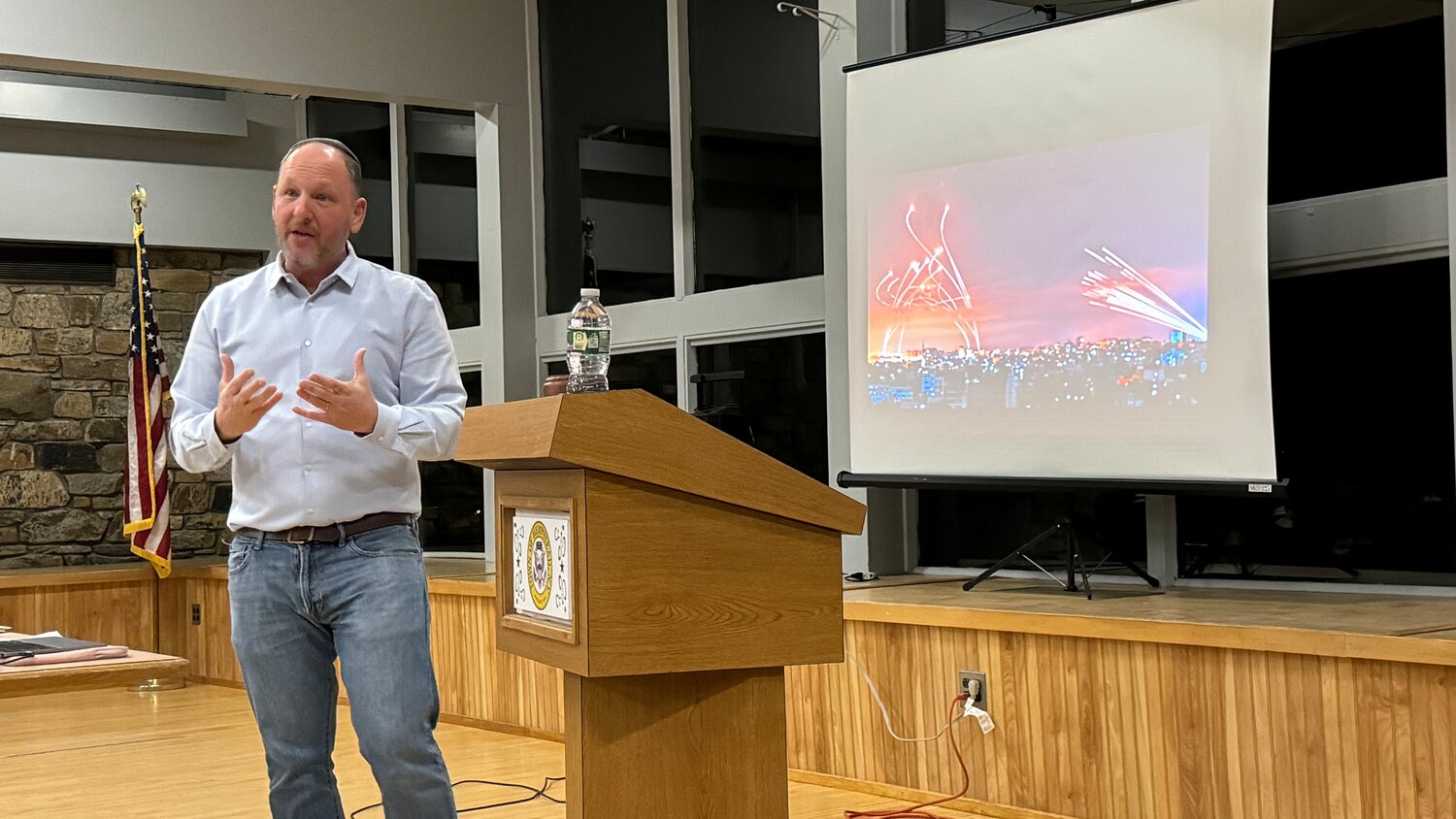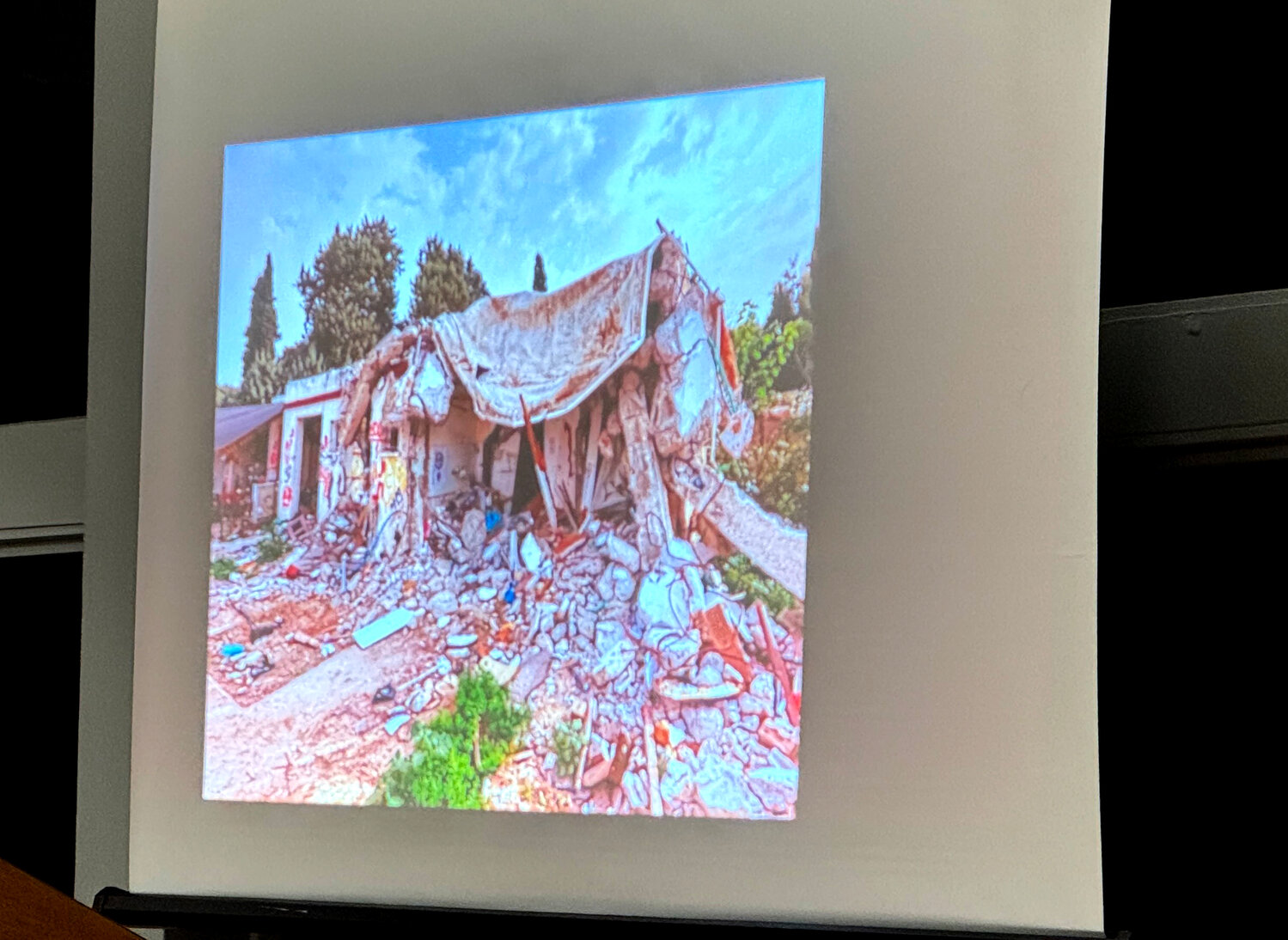South Shore Jewish communities gather to ‘bear witness’ to affects of war in Middle East
The South Merrick Community Civic Association is continuing to do its part to promote Jewish unity and community pride at home during the ongoing Israel-Hamas war.
The civic association welcomed David Sussman, of David Sussman Israel Tours, to its first meeting of the year on Jan. 17. A Boston native and an Israel Defense Forces veteran who has lived in Israel since the early 2000s, Sussman shared his experience of the Oct. 7 attack by Hamas — and what life has been like in the months since. He has led efforts to raise money to help those affected by the war.
In Sussman’s early days living in Israel, he worked as a bartender at an establishment called Mike’s Place. In 2003, two terrorists from England entered Israel with British passports, planning to blow themselves up inside the restaurant. They couldn’t get in, Sussman said, so instead they detonated the bombs outside, killing three people and injuring dozens.
“I hadn’t actually become a citizen of Israel (yet),” Sussman recalled. “I was there for a good time, not for a long time. I was just having the best time, living on the beaches of Tel Aviv, bartending. Why would I want to be anywhere else?”
But the attack on Mike’s Place changed him, he said. At age 27, he joined the IDF in an artillery unit, and was called up to serve in the 2006 Lebanon War. As a longtime resident of the country and a veteran, Sussman said he had seen Israel attempt ceasefires many times with Palestinian authorities and other outside threats.
Israelis, and Jews around the world, deserve to live freely and safely, Sussman said, without fear of terrorist attacks. “And it’s something that the people in Judea and Samaria, and the Arabs that live in Judea and Samaria, and the Arabs that are living in the Gaza Strip, also deserve,” he added.
In a presentation titled “Bear Witness,” Sussman showed photos and videos taken in communities near where Hamas entered Israel from Gaza on Oct. 7, killing some 1,200 people and taking more than 200 captive. Men, women and children were subject to horrific acts — murder, looting, rape, arson.
That morning, Sussman recounted, he was praying in a synagogue when a rocket was shot down directly overhead. But the sound of rockets and explosions was normal, he explained, and many people were numb to it. “It should never have come to this,” Sussman said. “We should have never allowed ourselves to be constantly shot at that we had to develop multibillion-dollar systems in order to protect ourselves.”
When alarms sounded, signaling that residents should enter the bomb shelters in their homes, Sussman and his family didn’t panic, he said.
“Three thousand rockets were shot — it causes some casualties, some damage, some panic,” he said. “But what we now know is that those rockets really only served as a distraction, to distract us from what Hamas was really about to do. And that was to breach our security barrier in 34 different points and attack the communities in the south, and try to penetrate Israel as far as possible.”
Months later, in grieving communities that are still trying to heal, Sussman has met with people who were at the front lines of the massacre, who have lost friends and family and are trying to make sense of what is left. Sussman showed images of families taken captive, homes that were burnt to the ground with people still in them, and posters that bear the names and faces of the dead.
In the rubble, Sussman said, people worked tirelessly to find any evidence of human remains. Those who have traveled to Israel, he said, are likely familiar with archaeological sites where children can sift through sand and look for pieces of pottery.
“This is what they were doing here,” Sussman said, referring to an image on the screen, “but they weren’t looking for pottery. They’re looking for a piece of a bone — something — that they could do some type of DNA analysis, in order to determine that this person was in this building, and was killed on this day.”
Sussman called the people working in these areas “unsung heroes.” The impact of the war, he said, has been felt around the world, and citizen heroes in Israel have created a feeling of togetherness that will help Jews everywhere. “To be able to experience this unity — it’s that unity that’s going to enable us to heal,” he said.
The South Merrick Community Civic Association is open to all residents of Merrick. It installed a new secretary of membership, Terri Cohen-Lieberman, at the Jan. 17 meeting, and she will be overseeing efforts to encourage more people to join. For more on the organization, visit SouthMerrickCivic.org. For more on Sussman and his efforts in Israel, go to DavidSussmanIsraelTours.com.

 43.0°,
Partly Cloudy
43.0°,
Partly Cloudy 







